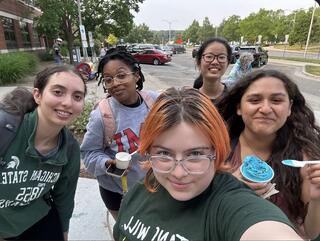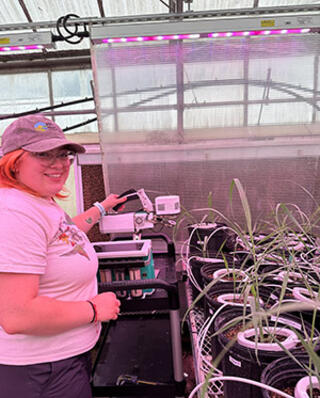Veronica Pargulski

This summer I worked in Dr. Berkley Walker’s lab with my mentor, Binod Basyal, at Michigan State University. Our project is looking at the physiological response of switchgrass to drought at different phenological stages. Our experimental set up is in the Plant Science Greenhouses on campus, where we have an automatic irrigation system with 80 switchgrass plants. Throughout the summer, three controlled drought events occurred: Drought during the vegetative stage, drought during the flowering stage, and drought during senescence. In each growth period, 20 plants were selected to be under drought conditions at low volumetric water content while the other plants were well-watered. There were also 20 control plants that never experienced drought conditions. Each week, Binod and I took measurements with instruments that provide robust photosynthesis and phytochemical data that allows us to compare gas exchange across treatment groups. We will also extract and sequence RNA and metabolites. At the end of August, we will harvest the biomass and send the samples to the GLBRC core facility for cell wall and fermentation analysis. The aim of this research is to study switchgrass drought response and learn during which phonological stage are the plants least able to recover from drought. We hope this will allow us to inform scientists and farmers in the future on how their crop will respond and perform during drought events, and how this will impact biofuel quality.

I am so thankful I had this experience because I learned a lot about how to conduct research and about a biofuel crop of interest. As part of the program, I was able to interact with graduate students and visit Kellogg Biological Station to tour the research fields there. This summer has also led to the opportunity to continue working in the Walker lab for the academic year. I’m excited to continue working on this project and future research with GLBRC. I’ve met lots of great people this summer and have enjoyed learning about their research. This has been so valuable as it has opened my eyes to grad school and future career opportunities.